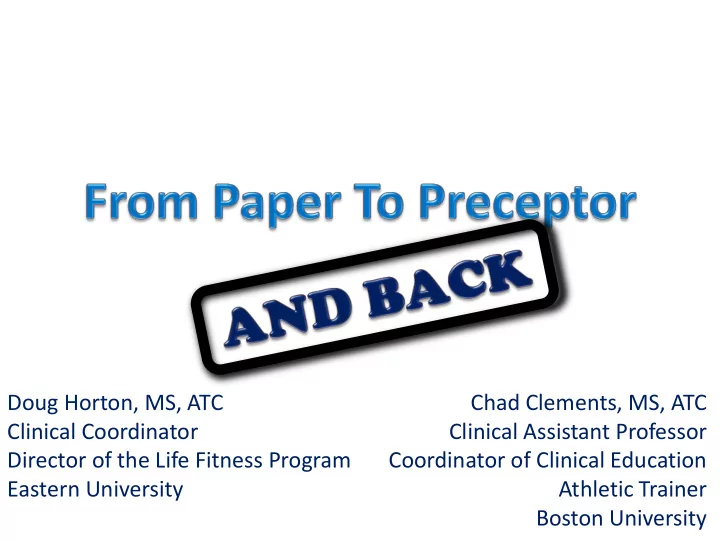

Doug Horton, MS, ATC Chad Clements, MS, ATC Clinical Coordinator Clinical Assistant Professor Director of the Life Fitness Program Coordinator of Clinical Education Eastern University Athletic Trainer Boston University
Laurent & Weidner (2002)
Developing an assessment plan: The Basics 1. Department / Program Mission Statement 2. Institutional Goals and Assessment 3. Department / Program Outcomes 4. Assessment Objectives 5. Progressive Curriculum Map 6. Assessment Strategies / Benchmarks 7. Administrative assessment of strategies
Characteristics of outcomes The outcome is our destination • Primary purpose is student learning • Should reflect the culture, mission and needs of an individual institution • Why we do what we do • What does a graduate from your program “look like”? – Knowledge, skills, values and habits
ATS winning National Championship during rotation with Villanova University
What are we telling them? • Do our students meet our standards? • External standards • Peer standards • Value-added – are our students improving? • Historical trends – is teaching and curricula improving • What we expect our graduate’s will look like – Knowledge, skills, values and habits
• Back to the destination and pathways images
Writing Objectives • Parts that together make up our Outcomes • What is our path….
Writing Objectives • Detailed aspects of the Outcome • Measurable, demonstrable components of a Student Learning Outcome – Clinical and Didactic • Bloom’s Taxonomy • SMART , POGAS
• S pecific • P urpose • M easurable • O bjective • A ttainable • G oals • R ealistic • A pplication • T ime Oriented • S tandards
How are you involving your preceptors?
Excellence takes time …
…and persistence
‘
It’s my preceptor Yes, I have a 100% mentor 75% 78% Pitney, 2004; Pitney, 2006
5 = strongly agree The clinical experience was 4.9 ± 0.3 an integral part of my educational development The ATP enhanced my 4.5 ± 0.7 personal growth
Identify and explain the tools.
Apply scientific evidence to implement safe and effective clinical practices.
Demonstrate contemporary skill in comprehensive care of patients with injuries.
Incorporate patient-centered outcome measures to evaluate the quality of care provided.
Achievement during real patient care = purposeful scheduling
Demonstrate contemporary skill in comprehensive care of patients with illnesses.
Chest Discomfort Recommendation Call EMS immediately for anyone with constant chest pain. Provide 1 regular (non- coated) or 2 “baby” aspirin for the victim to chew as long as contraindications and allergies to aspirin are not present. Evidence There is good evidence (LOE A) that providing aspirin can help in the event of a cardiac arrest and will not necessarily harm someone with chest pain of non- cardiac origin… Clinical Application Ensure the field kit is stocked with non-coated aspirin.
Tools for outcomes/objectives related to clinical skills Behaviors (eg, communication, professionalism)?
‘
Assessment Strategies / Benchmarks • Strategies may be used to cover multiple objectives • Rubrics must be used to gauge learning • Assignments may be used but grades don’t tell the story – Multiple assignments – Projects / Presentations – Practicum evaluations
Assessment Strategies / Benchmarks • Determine % of students that earn at least a minimally acceptable score • Compare against national averages or compare to peer institutions • Base some off of CAATE’s standards – Pass rate – Job placement – Alumni Surveys
Education of Preceptors to our outcomes / objectives 1. Involve: Collaborate with preceptors = buy-in 2. Inform: Use preceptor programming to set expectations 3. Inspect: have our expectations been met?
Quality Assurance Outcome Exceptional Very Good Adequate Inadequate 5% 85% 10% 0 Communication 7% 70% 20% 3% Critical Thinking 4% 60% 30% 6% Writing Professionalism 15% 75% 10% 0 Evidenced-based 6% 40% 50% 4% Clinical Practice
Utilizing the results for change • Improve curriculum • Maximize learning • Tutoring • Library Services • Academic advisement and counseling • Technology • Co-curricular opportunities • Budgeting • Academic review • Improve relationships / learning at clinical sites
OBJECTIVES OUTCOMES What are the What we want measurable our graduates to pieces that make look like up our outcomes REFINEMENT ASSESSMENT -Curricular Changes Have we met our - Preceptor Education benchmarks and - Modify Tools what do our students look like
Thank You
Recommend
More recommend